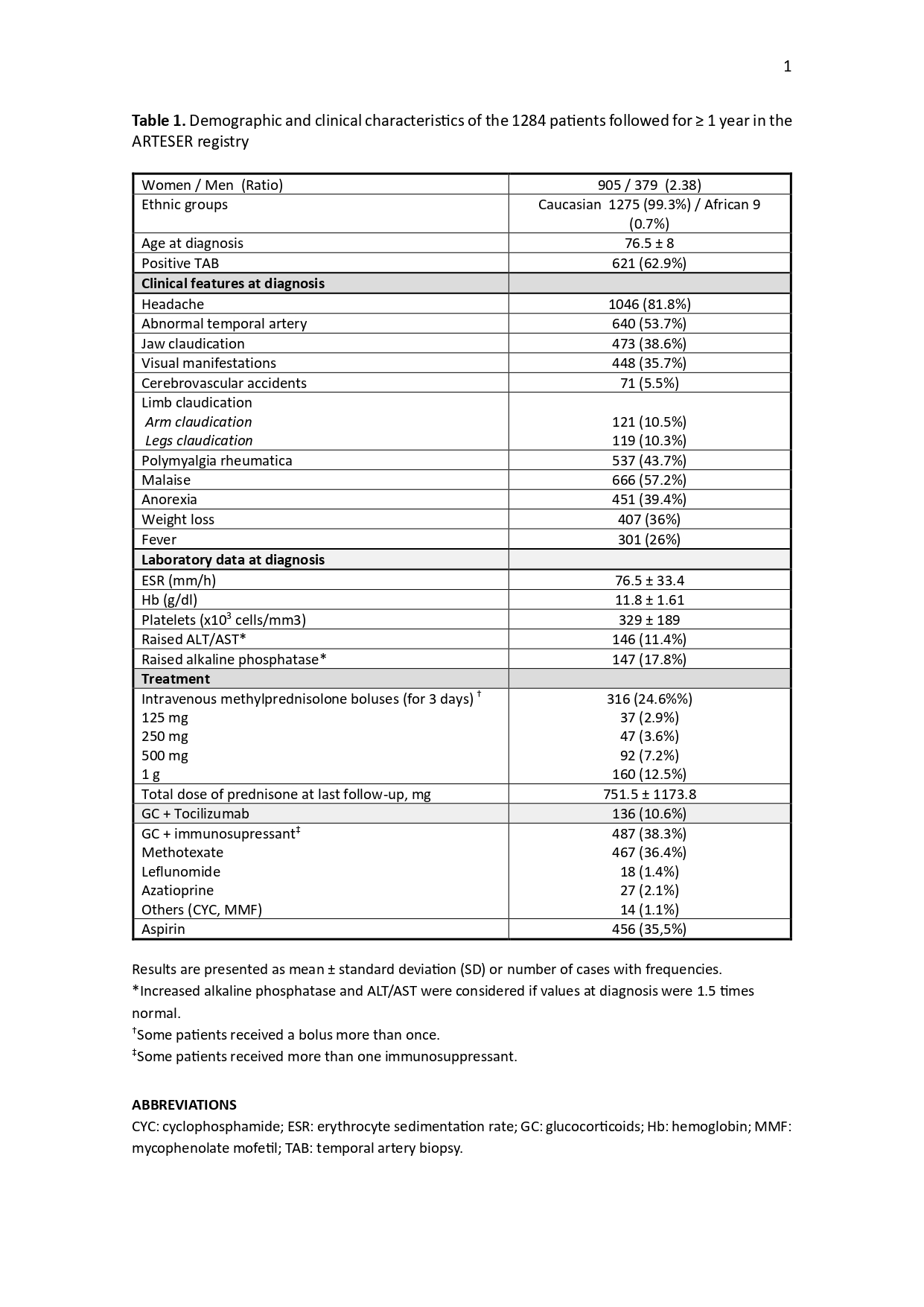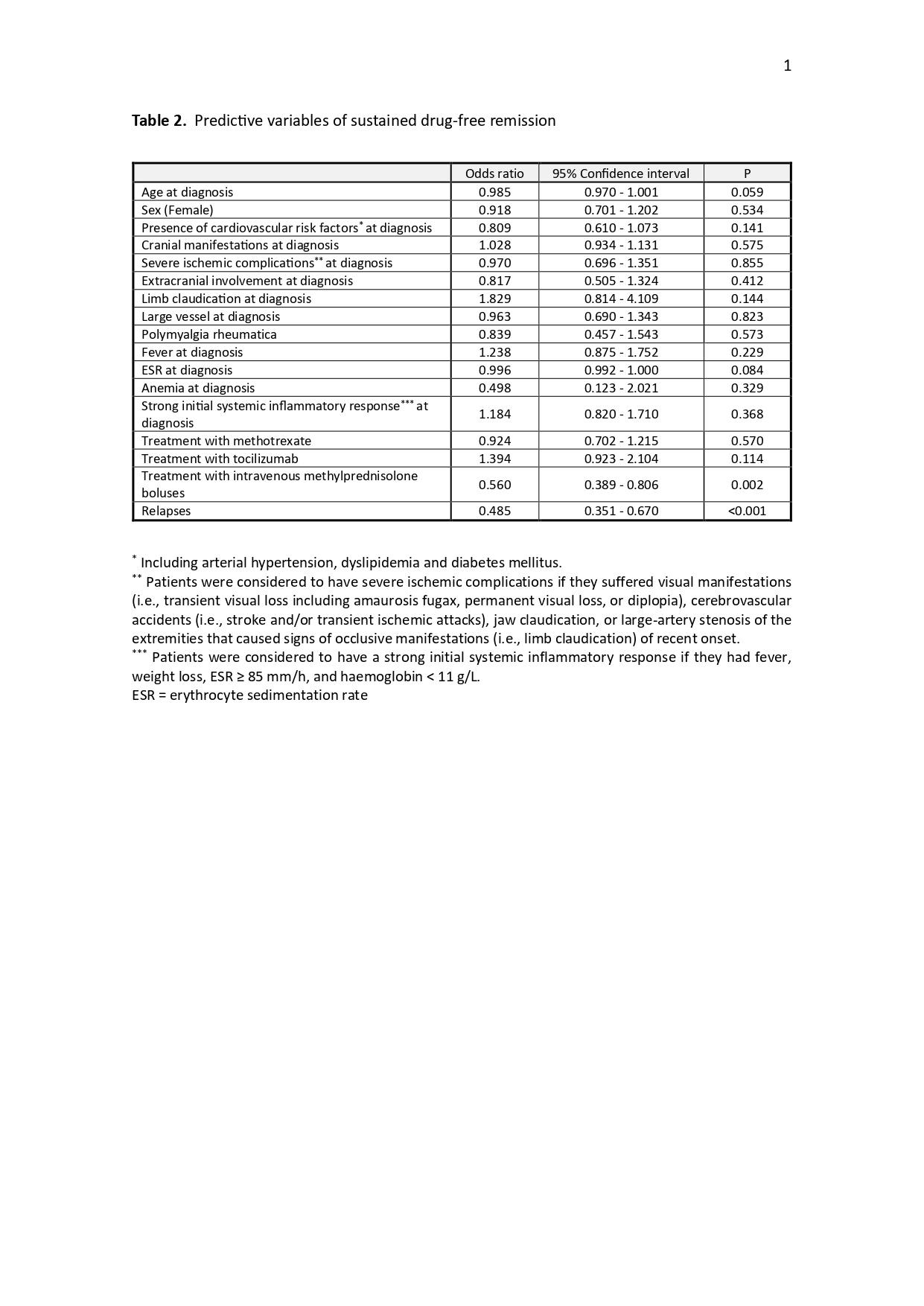Session Information
Date: Saturday, November 16, 2024
Title: Vasculitis – Non-ANCA-Associated & Related Disorders Poster I
Session Type: Poster Session A
Session Time: 10:30AM-12:30PM
Background/Purpose: To evaluate the frequency and timing of sustained drug-free remission (SDFR) in a Spanish cohort of patients with giant cell arteritis (GCA) and to identify potential predictive factors for this outcome
Methods: We conducted a retrospective review of all patients included in the large Spanish multicenter registry for GCA (ARTESER) from June 1st, 2013, to March 29th, 2019. SDFR was defined as the absence of typical signs, symptoms, or other features of active GCA for at least 12 months after discontinuing treatment. A generalized estimating equation (GEE) logistic regression model was used to identify risk factors for SDFR
Results: We included 1,284 patients who underwent at least one year of follow-up. Forty-two percent had received concomitant treatment with tocilizumab and/or immunosuppressants, mainly methotrexate. Table 1 summarizes their general characteristics and main clinical and laboratory data. The pooled proportions of patients achieving sustained drug-free remission (SDFR) at 2, 3, and 4 years were 6.3%, 20.5%, and 25.3%, respectively. Disease flares were observed less frequently in patients with SDFR compared to those without (21% vs. 27%; p = 0.114). Patients who reached SDFR were able to decrease their prednisone dosage to 10 mg/day and 5 mg/day more rapidly than those who did not achieve remission (p = 0.131 and p < 0.001, respectively). The cumulative doses of prednisone at one year were significantly lower in patients who attained SDFR (637.4 ± 964.5 g vs. 774 ± 1209.6 g; p < 0.001).
Multivariate analysis (Table 2) revealed that only the presence of relapses (OR: 0.485, 95% CI: 0.351 to 0.670; p < 0.001) and the necessity for IV methylprednisolone boluses at diagnosis (OR: 0.560, 95% CI: 0.389 to 0.806; p = 0.002) were significantly associated with a decreased likelihood of achieving SDFR. Neither the coexistence of polymyalgia rheumatica (PMR) nor the severity of the inflammatory response at diagnosis reached statistical significance.
The median follow-up time for patients who achieved SDFR was 48 months (IQR 25th-75th: 36 – 48 months). Only 5 patients experienced a recurrence, occurring at a median of 19 months post-SDFR, (IQR 14 – 35 months).
Conclusion: Within 2-3 years of diagnosis, only one-quarter of patients with GCA successfully reach SDFR. Once SDFR is achieved, the likelihood of experiencing recurrences is notably low. Relapses and the requirement for GC boluses appear to be predictors of long-term GC need.
To cite this abstract in AMA style:
Narvaez-García J, Domínguez-Álvaro M, Galíndez-Agirregoikoa E, Mendizabal J, Abasolo Alcazar l, Loricera J, Garrido-Puñal N, Castañeda S, Moya P, Larena C, Estrada-Alarcón P, Galisteo C, Riveros Frutos A, Ortiz Sanjuan F, Salman Monte: T, Vasques Rocha: M, Iniguez Ubiaga C, Garcia-Gonzalez M, Blanco-Alonso R. Sustained Drug-free Remission in Giant Cell Arteritis: Results Results of the Spanish ARTESER Registry [abstract]. Arthritis Rheumatol. 2024; 76 (suppl 9). https://acrabstracts.org/abstract/sustained-drug-free-remission-in-giant-cell-arteritis-results-results-of-the-spanish-arteser-registry/. Accessed .« Back to ACR Convergence 2024
ACR Meeting Abstracts - https://acrabstracts.org/abstract/sustained-drug-free-remission-in-giant-cell-arteritis-results-results-of-the-spanish-arteser-registry/


